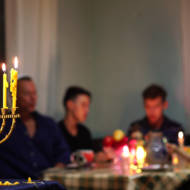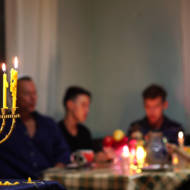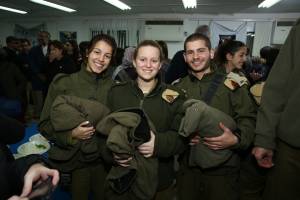
Chanukah Guide for the Perplexed 2020

Chanukah is the only ancient Jewish holiday that commemorates a Land of Israel national liberation struggle.
By Ambassador (ret.) Yoram Ettinger, The Ettinger Report
Historical context: Chanukah, the holiday of light, is narrated in the four Books of the Maccabees, The Scroll of Antiochus and The Wars of the Jews. The Greek Empire was split into Greece-Seleucid/Syria-Ptolemaic/Egypt following the death of Alexander the Great (323 BCE), who held Judaism in high esteem. In 175 BCE, the Seleucid/Syrian Emperor Antiochus (IV) Epiphanies claimed the Land of Israel, and suspected that the Jews were allies of his Ptolemaic/Egyptian enemy. Therefore, he aimed to exterminate Judaism and convert Jews to Hellenism. In 169 BCE he devastated Jerusalem, massacred Jews and prohibited the practice of Judaism.
A 166/7 BCE rebellion was led by members of the Hasmonean (Maccabee) family, which included Mattityahu, the priest, and his five sons, Yochanan, Judah, Shimon, Yonatan and Eleazar, who established Jewish independence until 37 BCE.
The success of the Maccabees on the battlefield was consistent with the reputation of Jews as superb warriors, who were frequently hired as mercenaries by Egypt, Syria, Rome and other global and regional powers.
When ordered by Emperor Antiochus (Book of Maccabees A: 15:33) to end the “occupation” of Jerusalem, Jaffa, Gaza, Gezer and Akron, Shimon the Maccabee responded: “We have not occupied a foreign land…. We have liberated the land of our forefathers from foreign occupation.”
Chanukah according to David Ben Gurion: Israel’s Founding Father and first prime pinister, a modern-day Maccabee, said, “The struggle of the Maccabees was one of the most dramatic clashes of civilizations in human history, not merely a political-military struggle against foreign oppression…. Unlike many peoples, the meager Jewish people did not assimilate. The Jewish people prevailed, won, sustained and enhanced their independence and unique civilization…. It was the spirit of the people, rather than the failed spirit of the establishment, which enabled the Hasmoneans to overcome one of the most magnificent spiritual, political and military challenges in Jewish history….” (Uniqueness and Destiny, pp 20-22, David Ben Gurion, IDF Publishing, 1953).
Chanukah and the Land of Israel: The mountain ridges of Judea and Southern Samaria (especially the Land of Benjamin) were the platform of critical Maccabees’ military battles: Mitzpah (the burial site of the Prophet Samuel, overlooking Jerusalem), Beth El (the site of the Ark of the Covenant and Judah the Maccabee’s initial headquarters), Beth Horon (Judah’s victory over Seron), Hadashah (Judah’s victory over Nicanor), Beth Zur (Judah’s victory over Lysias), Ma’aleh Levona (Judah’s victory over Apolonius), Adora’yim (a Maccabean fortress), Eleazar (named after Mattityahu’s youngest Maccabee son), Beit Zachariya (Judah’s first defeat), Ba’al Hatzor (where Judah was defeated and killed), Te’qoah, Mikhmash and Gophnah (bases of Shimon and Yonatan), the Judean Desert, etc.
Chanukah is the only ancient Jewish holiday that commemorates a Land of Israel national liberation struggle, unlike Passover (Egypt), Sukkot/Tabernacles and Shavuot/Pentecost (the Exodus in the Sinai Desert) and Purim (Persia).
Chanukah’s optimism: The first, of eight, candles of Chanukah (December 11, 2020) is always lit when daylight hours of the year begin to increase, ushering in longer daylight hours, symbolizing bolstered optimism. Chanukah’s 9-branched candelabrum – including a “helper/Shamash” candle – highlights spiritual and physical liberation against formidable odds, energized by faith, value-driven tenacity, patriotism, optimism and adherence to historical, cultural and religious roots in defiance of convenient political-correctness.
Chanukah commemorates the victory of light (Maccabees) over darkness and remembrance over forgetfulness. The Hebrew spelling of darkness – חשכה – consists of the same letters as forgetfulness – שכחה.
Hebrew significance of Maccabee: The word Maccabee (י מכבorמקבי ) is a derivative of the Hebrew word for sledgehammer (מקבת), describing the Maccabees’ overwhelming fighting capabilities. It may be a derivative of the Hebrew word for extinguishing (כבה), which was the fate of most of the Maccabees’ adversaries. It is also a Hebrew acronym of the Maccabees’ battle cry – מי כמוך באלים י’: “Who could resemble you among Gods, O Adonai.” The four Books of the Maccabees were written in Latin, which sometimes pronounces C like TZ. Therefore, the origin of the Hebrew word Maccabee could be the Hebrew word Matzbee – commander.
Chanukah’s first of eight days is celebrated on the 25th day of Kislev, the Jewish month of miracles (e.g., Noah’s Rainbow appeared in Kislev). Moses completed the construction of the Holy Ark on the 25th day of Kislev, as was the date of the laying the foundation of the Second Temple by Nehemiah. Moreover, the 25th stop of the People of Israel – during the Exodus from Egypt to the Land of Israel – was Hashmona (the same Hebrew root as Hasmoneans). Also, the 25th Hebrew word in Genesis is “light,” which is a Hebrew metaphor for the Torah.
The US-Chanukah connection: https://bit.ly/2SbCQ9B.
Keep Israeli Soldiers Warm this Winter – Send Gifts for Chanukah!
This Chanukah, we are honored to thank the young soldiers of the IDF who risk their lives to defend the people of Israel.
Join us in sending winter care packages and personal notes of support to Israeli soldiers who are out in the cold all day.
Warm up a soldier’s heart with essential winter wear including fleece jackets. Keep an entire unit warm by ordering 10 packages…
THE SOLDIERS REALLY APPRECIATE YOUR LOVE AND CONCERN!
Click Here to Send Your Chanukah Gift and Personal Note to Israeli Soldiers
The post Chanukah Guide for the Perplexed 2020 first appeared on United with Israel.
United with Israel
